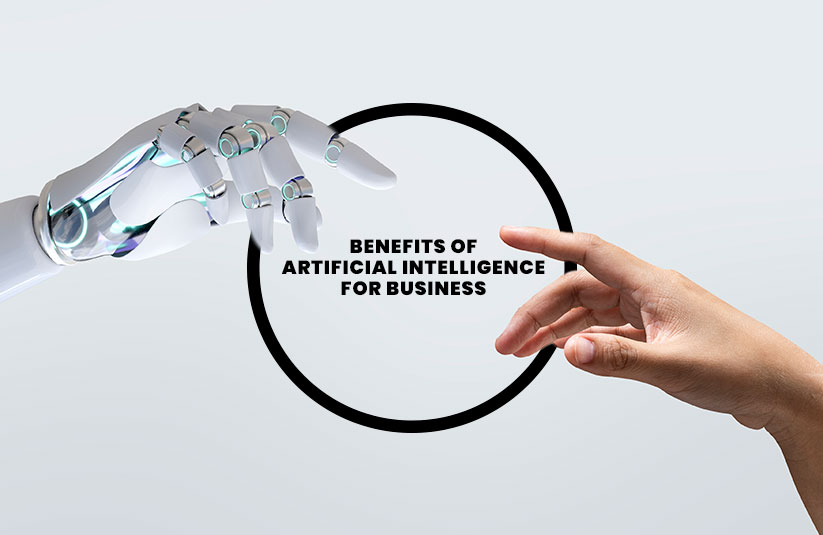Artificial intelligence (AI) for business has become increasingly prevalent in both non-tech organizations and tech companies alike. Harnessing the power of AI technology, businesses aim to streamline operations, improve productivity, increase sales, and elevate customer experiences.
Many non-tech organisations are beginning to use artificial intelligence in their operations, as well as many tech companies. The term “artificial intelligence” is now one that we frequently hear throughout the day.
Artificial intelligence (AI) has been around since 1956, when it all began as a product of human intelligence. However, it took a long time to leave the lab and be ready for use. Since its release, numerous digital behemoths including Apple, Amazon, and Google have begun integrating artificial intelligence through the use of Siri, Alexa, and Google Assistant, respectively.
Businesses should consider integrating the complete range of smart technologies, such as machine learning, natural language processing, and others, into their procedures and goods if they want to reap the most rewards. However, even companies that are new to AI can experience significant benefits.
1. Productivity & Efficiency Gains
Gains in productivity and efficiency are two of the benefits of AI integration in enterprises that are commonly discussed. The velocity and scale at which the technology completes tasks surpasses that of humans. Meanwhile, AI frees up human workers to focus on higher-value jobs that machines can’t handle by taking over those tasks from them. This enables businesses to maximise the skills of their human resources while minimising the costs involved with doing routine, recurring operations that can be handled by technology. Therefore, businesses that adopt AI prompt engineering will be able to increase the overall ROI on all resources.
2. Customer Support
Customer support is the capacity of a company to address and satisfy the needs of its clients as those clients’ consumer preferences alter over time. Such activities, from a digital perspective, include the development of Help Desk tickets that record customer issues and digital outreach initiatives that cater to consumers’ interests and strengthen client connections.
Through the use of virtual chatbots, customer intent prediction, multi-channel communication suited to customer preferences, and the rerouting of business-consumer contacts to the proper departments, these relatively straightforward processes are readily automated and improved.
The success of a company’s marketing plan depends on how well it can sell its goods and draw in customers. This calls for the management of social media, e-commerce alerts, market research, website analytics, and other things.
3. Personalized Customer Experience
By enhancing the customer experience, businesses may learn how to stand out to customers. They may do this by offering data-driven, personalised recommendations for products and content, AI-assisted dialogue, targeted personality-based marketing, and enhanced customer response times.
Additionally, there are significant advantages to using machine learning as a corporate analytical tool. Businesses can track and analyse sales and marketing data using AI to look for correlations and trends that lead to structural flaws in the company model. Additionally, AI may offer creative, occasionally unexpected solutions to data-driven business issues, which can subsequently be put into practise to improve customer experiences and lessen inefficient workflows.
4. Market & Consumer Insight
Behavioral data surplus has evolved into the most valuable piece of knowledge a company or for-profit institution may have in the age of surveillance capitalism. Consumer sentiment has a significant impact on market dynamics, but this information was previously impossible to transmit and quantify.
Businesses today have indirect access to a wealth of digital data that details every aspect of a person’s life, including age, gender, demographics, personality traits, political and social interests, socioeconomic status, career aspirations, social networks, and a lot more.
A worldwide civilization of hyper-socialization and interconnection where the distinction between company and consumer is blurred has been created because to the rise of social media and smart devices. Businesses may personify themselves on social media sites like Instagram, Facebook, and Twitter and provide individualised customer experiences that are supported by big data predictive analytics and machine learning.
5. Reduce Overall Costs
The ability of a business to operate more successfully and efficiently is the outcome of all of the aforementioned advantages. The business will gain from this even though some employees may eventually lose their jobs and be replaced with autonomous agents.
Businesses will be able to maximise their financial profits and minimise their financial losses by identifying weak points in their business models, growing their digital presence, and offering products that are tailored to the individual needs of customers thanks to the introduction of AI tools that enable Big Data analytics.
Even if investments in AI may be expensive in the short term, companies that choose not to adopt and benefit from it will quickly fall behind those that do and will incur more significant financial costs in the long run.
Read More: 6 key elements for business development strategy
Conclusion:
At ‘Our Business Ladder’, we thoroughly master both business intelligence & artificial intelligence and thereby, we are well-equipped in enabling Artificial intelligence for businesses and also implement business intelligence skills.
FAQs
How is artificial intelligence used in businesses?
Based on sales results & client interaction, AI enables accurate and automated sales projection. It also supports lead prioritization.
How can artificial intelligence change business operations?
AI enables business owners to proffer personalized customer experience. It can also analyse big data in an effective manner.
How do machine learning and artificial intelligence helps businesses?
These advanced technologies enable efficient usage of data. It helps in resolving complex problems and allows businesses to scale up the operations swiftly.













